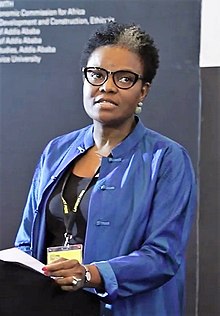Alcinda Honwana
Alcinda M. Honwana(born 1962[1]) is a Mozambican anthropologist who is the Strategic Director of the Firoz Lalji Centre for Africa at the London School of Economics. Her research considers young people and leadership. She has served as an adviser for the United Nations and the Social Science Research Council.
Alcinda Maria Rodolfo Manuel Honwana | |
|---|---|
 Honwana in 2018 | |
| Born | 1962 (age 57–58) |
| Academic background | |
| Alma mater | SOAS University of London (PhD) University of Paris (MA) Eduardo Mondlane University (BA) |
| Thesis | Spiritual agency & self-renewal in southern Mozambique (1996) |
| Academic work | |
| Institutions | London School of Economics Open University University of Cape Town |
Early life and education
Honwana was born in Mozambique.[2][3] She completed her undergraduate studies at the Eduardo Mondlane University, specialising in history and geography. She moved to Paris for her graduate studies, working toward a master's degree (maîtrise) in sociology at the University of Paris VIII.[2] For her doctoral studies Honwana moved to the United Kingdom, joining SOAS University of London to study social anthropology.[2] Her early research considered trauma and healing in Mozambique.[4][5]
Research
After completing her doctorate in 1996, Honwana was appointed a senior lecturer at the University of Cape Town.[3] Here she served on the board of the Council for the Development of Social Science Research in Africa and worked in the United Nations Office for Children and Armed Conflict led by Olara Otunnu.[6] Honwana held a visiting position at The New School teaching a graduate course in Anthropology. She joined the Board of the African Studies Association and acted as an adviser for the United Nations.[7]
In 2005 Honwana returned to the United Kingdom, where she was made Chair of International Development at the Open University. There she coined the term waithood, which describes the prolonged period of time African children face between childhood and adulthood.[8][9] Waithood is the time in which young people are “no longer children in need of care, but … are still unable to become independent adults,”.[10] Honwana has argued that youth protest movements arise because of economic and societal pressures.[9][11] Honwana argued that youth-led protests often struggle to translate their political aspirations into meaningful action, particularly because they struggle to articulate what they want to achieve.[9] She was made the 2007 Prince Claus Chair for Development and Equity at Utrecht University the Netherlands.[12] She delivered a TED talk in London in 2013, where she discussed how young people in Africa must fight for their socioeconomic and political rights.[13]
Honwana was appointed to the London School of Economics in 2015, where she was made Strategic Director at LSE's Firoz Lalji Centre for Africa.[14][15] Here she has led calls to decolonise curricula.[16] In 2018 Honwana delivered the Kapuscinski Development Lecture of the United Nations Development Programme, where she discussed youth movements.[17]
Selected publications
Academic journals
- Honwana, Alcinda (2014-01-01). "2 'Waithood': Youth Transitions and Social Change". Development and Equity: 28–40. doi:10.1163/9789004269729_004.
Books
- Honwana, Alcinda Manuel. The time of youth : work, social change, and politics in Africa. ISBN 978-1-56549-471-8. OCLC 862746455.
- Honwana, Alcinda. Child Soldiers in Africa. ISBN 978-0-8122-0477-3. OCLC 956784852.
- Honwana, Alcinda. (2013). Youth and Revolution in Tunisia. Zed Books. ISBN 1-299-71775-6. OCLC 851696014.
- Makers & breakers : children & youth in postcolonial Africa. Honwana, Alcinda Manuel., Boeck, Filip de. Oxford: James Currey. 2005. ISBN 0-85255-433-8. OCLC 56913029.CS1 maint: others (link)
References
- Congress, The Library of. "LC Linked Data Service: Authorities and Vocabularies (Library of Congress)". id.loc.gov. Retrieved 2020-06-21.
- "princeclauschair - CV Honwana". princeclauschair.nl. Retrieved 2020-06-21.
- "Alcinda Honwana | Conciliation Resources". www.c-r.org. Retrieved 2020-06-21.
- "Sealing the past, facing the future: Trauma healing in rural Mozambique | Conciliation Resources". www.c-r.org. Retrieved 2020-06-21.
- Honwana, Alcinda (1999-07-01). "The collective body : challenging western concepts of trauma and healing". Track Two : Constructive Approaches to Community and Political Conflict. 8 (1): 0. ISSN 1019-7435.
- Honwana, Alcinda (1998). "Discussion guide 4: Non-western concepts of mental health" (PDF). ADPM.
- "Next Generation Social Sciences in Africa". Social Science Research Council. Retrieved 2020-06-21.
- "Perspectives Africa: Movers and Shakers? Youth and Political Change in Africa | Heinrich Böll Stiftung". Heinrich-Böll-Stiftung. Retrieved 2020-06-21.
- "Youth, Waithood, and Protest Movements in Africa". GSDRC. Retrieved 2020-06-21.
- Doxtdator, Benjamin (2016-04-17). "Alcinda Honwana - On Waithood". Long View on Education. Retrieved 2020-06-21.
- Kremer, William (2015-10-31). "Why the world's youth are waiting to grow up". BBC News. Retrieved 2020-06-21.
- "princeclauschair - Chairholders". princeclauschair.nl. Retrieved 2020-06-21.
- Unknown (2013-03-15). "TEDxEuston: Alcinda Honwana at TEDxEuston 2012 - "Africa in the hands of its youth"". TEDxEuston. Retrieved 2020-06-21.
- November 12th; 2015|Events; Comments, Featured|0 (2015-11-12). "Excluded youth are becoming angrier – Alcinda Honwana previews her upcoming LSE lecture". LSE International Development. Retrieved 2020-06-21.
- "Are global youth protests learning from the Arab Spring?". Africa at LSE. 2019-11-25. Retrieved 2020-06-21.
- Science, London School of Economics and Political. "Decolonising the Curricula: why necessary and why now". London School of Economics and Political Science. Retrieved 2020-06-21.
- "Alcinda Honwana – Kapuscinski Development Lectures – what top thinkers think about development". Retrieved 2020-06-21.